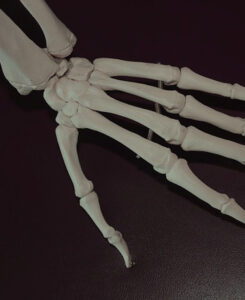
Bone diseases such as osteoporosis, osteopenia and osteomalacia may also be more common in people who have had a gastrectomy although not all studies have found this to be true. When you have osteoporosis, the strength and size of your bones are reduced. Even a small injury may lead to broken bones. To maintain good bone health and prevent osteoporosis you should eat a balanced diet that includes adequate calcium and vitamin D, engage in regular physical activity, avoid heavy alcohol use, and not smoke.
It is possible that bone disease after gastrectomy may be due to reduced dietary intake of calcium and vitamin D, reduced absorption of calcium and /or vitamin D, and possibly changes in hormones that regulate bone metabolism. Evidence for any of these factors is unclear.
Regardless, it is important to monitor bone density (DEXA) and vitamin D levels (25-OHD Vitamin D) and consume adequate amounts of calcium and vitamin D-rich foods. The current guidelines from the Institute of Medicine recommend a 25-OHD level of 20 mg/mL for good bone health. The Institute of Medicine recommends an intake of 600 IU per day of vitamin D for those under the age of 70 years and 600 IU per day of vitamin D for those over the age of 70 years. It is not safe to take levels of vitamin D beyond 4,000 IU per day.
Calcium recommendations for bone disease prevention are 1,000 mg/day for women 50 years and younger and men 70 years and younger. For women 50 years and older and men over 70 years the recommendation is 1200 mg per day. For patients with confirmed bone disease (based on bone mineral density test) or those at risk of bone disease your health care provider may recommend 1500 mg per day of calcium and 800 IU of vitamin D per day. For one’s safety, it is recommended that individuals do not consume, either through supplements or food consumption, over 2,500 mg of calcium daily.
| Selected Calcium-Rich Foods | |
|---|---|
| Food | Calcium (mg) |
| 8 oz. yogurt without added fruit | 400 |
| Evaporated skim milk, ½ cup | 400 |
| Fortified oatmeal, 1 packet | 350 (varies) |
| Sardines, canned in oil, with edible bones, 3 oz. | 324 |
| Cheddar cheese, 1½ oz. shredded | 306 |
| Milk, nonfat, 1 cup | 302 |
| Yogurt, plain, low-fat, 1 cup | 300 |
| Soybeans, cooked, 1 cup | 261 |
| Tofu, firm, with calcium, ½ cup | 204 |
| Orange juice, fortified with calcium, 6 oz. | 200–260 (varies) |
| Salmon, canned, with edible bones, 3 oz. | 181 |
| Pudding, instant (chocolate, banana, etc.) made with 2% milk, ½ cup | 153 |
| Baked beans, 1 cup | 142 |
| Cottage cheese, 1% milk fat, 1 cup | 138 |
| Frozen yogurt, vanilla, soft-serve, ½ cup | 103 |
| Ready-to-eat cereal, fortified with calcium, 1 cup | 100–1,000 (varies) |
| Turnip greens, bok choy, boiled, ½ cup | 99 |
| Broccoli, raw, 1 cup | 90 |
| Ice cream, vanilla, ½ cup | 85 |
| Soy or rice milk, fortified with calcium, 1 cup | 80–500 (varies) |
| Selected Foods with Vitamin D | |
|---|---|
| Food | Vitamin D (IU) |
| 8 oz. milk | 400 |
| Fatty fish such as tuna, mackerel, and salmon 3-4 oz | 360 |
| Yogurt (varies) | 40 -80 |
| Fortified orange juice | varies |
| Fortified soy milk | varies |
| Margarine, 1 Tbs | 60 |
| Egg yolk, 1 | 25 |
Supplements
While food sources of calcium and vitamin D are best, it is often very difficult for people – especially those who have had a gastrectomy to get enough calcium and vitamin D by dietary sources alone. Supplements are often necessary and recommended.
Calcium Supplements
Common calcium supplements include calcium carbonate, calcium phosphate, and calcium citrate. These supplements contain different amounts of elemental calcium which is the actual amount of calcium in the supplement. It is important to read the label to determine the actual amount of calcium (elemental calcium) that is in the supplement. Calcium citrate is recommended for individuals who have had a gastrectomy since it does not require stomach acid for absorption. does
Calcium is absorbed best when taken in small doses; therefore if you are taking 1500 mg per day, this should be taken as 500 mg calcium citrate three times per day. Vitamin D may be taken with calcium or as a separate supplement. Some individuals may choose to consume a supplement that contains both calcium and vitamin D. Whether taken as one capsule or separately, the total amount of vitamin D consumed is important for maintaining vitamin levels.